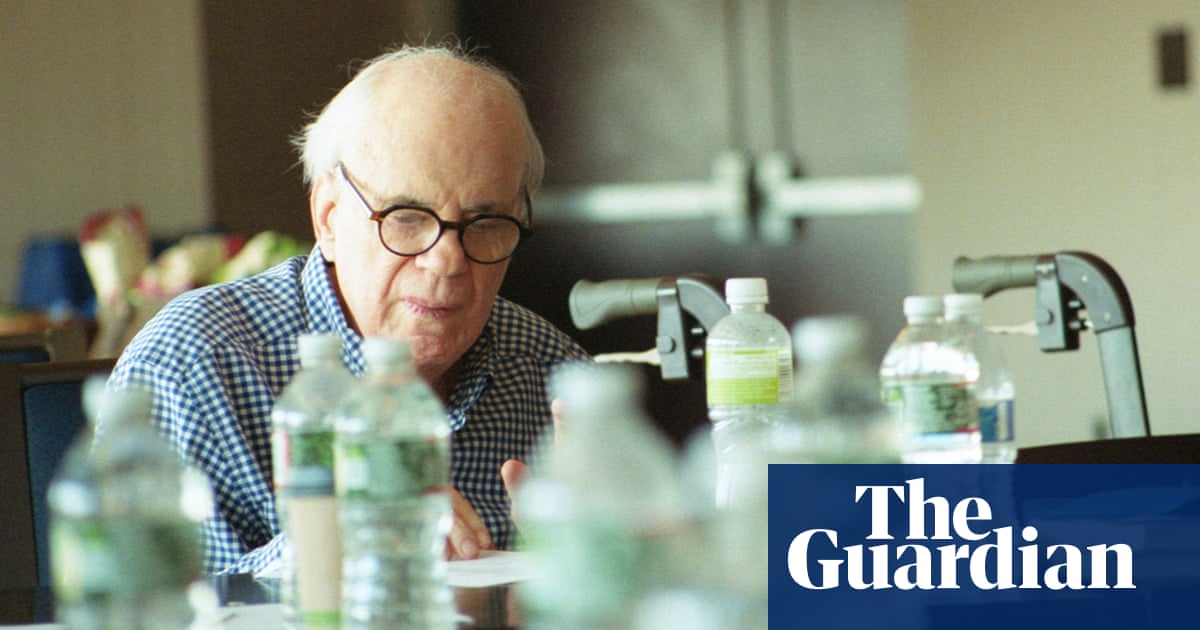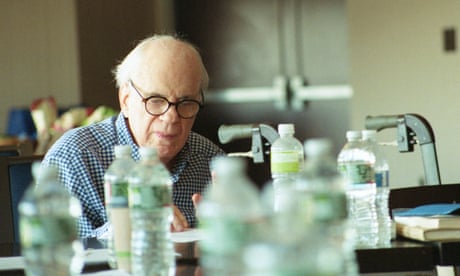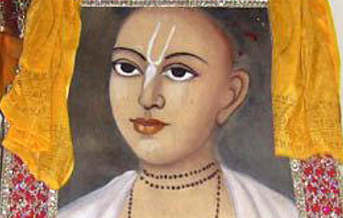
In 1970, the philosopher Saul Kripke, who has died aged 81, gave three lectures at Princeton University that shook up Anglo-American philosophy. Speaking without notes, he interwove topics in the separate fields of modal logic (concerning necessity and possibility), philosophy of language and philosophy of mind, transformed each, and resuscitated metaphysics.
The resulting book, Naming and Necessity (1980), is one of the major philosophical works of the 20th century. It opens with an apparently abstruse question: what connects a name to the individual – whether present, distant or dead – who is named? While at Omaha high school, he was asked to solve a maths problem by the nearby Strategic Air Command base, and, at the age of 18, wrote A Completeness Theorem in Modal Logic which in 1959 was published in the Journal of Symbolic Logic. As a result, the logician Richard Montague cancelled a scheduled talk that he deemed to have been pre-empted, and Harvard invited Kripke to apply for a teaching post in maths. “My mother said that I should finish high school and go to college first,” was his reply.
He taught graduate-level logic classes at MIT while studying maths at Harvard, and in 1968, six years after graduating, was appointed associate professor of philosophy at Rockefeller University (in New York City), then professor at Princeton (1977-2003), and finally at the City University of New York (CUNY).
Thus we can correctly refer to Richard Nixon purely “in virtue of our connection with other speakers in the community, going back to the referent himself”, and irrespective of whether we know much about him. “[I]t is not how the speaker thinks he got the reference” that determines what he is referring to, any more than it is his knowledge of how electricity works that enables him to switch on a light, but a causal-historical chain quite external to him that reaches back to the originally named individual.
Despite his enormous contribution to philosophy – including philosophy of mathematics, personal identity, the liar’s paradox and the nature of truth –Kripke produced only those two books (he hated writing), plus a transcription of the John Locke Lectures he gave at Oxford in 1973 entitled Reference and Existence. The first volume of his collected papers, Philosophical Troubles, was published in 2011, and unpublished manuscripts, lecture notes and recordings are being steadily organised for publication in the Saul Kripke Center in New York.
He frantically urged a friend to drive faster so that they could reach their destination and have time to cook before Friday sundown and considered himself prohibited from writing down his thoughts during the Sabbath, although entitled to have them.
The US philosopher Willard Van Orman Quine, had influentially argued that whether an entity has the same property in assorted possible worlds depends on how it is described in each; that it has no essential properties in itself. But, said Kripke, “possible worlds” are not distant planets on which we can glimpse varied alternatives of what Richard Nixon, for instance, did in the actual world, thus making it a moot point “which one of these people, if any, is Nixon”.
Reference to an entity (or type of entity) after its “initial ‘baptism’” encompasses its essential properties by default, whether they are known or not. Initially, and for centuries, “heat” applied merely to “that which is sensed by sensation S”, but nonetheless, in using the term, we were inadvertently referring to heat’s imperceptible chemical constitution – otherwise we would not have been referring to heat at all.
He showed that this is a false analogy. For God to create heat, he said, was for God to create molecular motion (that is what heat is), but molecular motion could have existed without being felt as hot. With pain, however, “the element of contingency … cannot lie… in the relation between the phenomenon … and the way it is felt or appears (sensation S)”, for “there is no ‘appearance’ beyond the mental phenomenon itself”. What “pain” rigidly designates cannot come apart from being felt: it precisely is such a feeling.
Rather, they are simply “counterfactual situations” that can be differently “stipulated” as wished. In some of them we imagine Nixon being a garbage collector, or dying aged 10, or not existing at all. In all of them, though, “Richard Nixon” names the person who was engendered from a particular sperm and egg, and who, whatever he in fact ended up doing, has “transworld identity” across possible worlds. How could he not be himself?
Kripke’s thought experiment about God creating heat may be meant literally. Evasive on the “personal question” as to whether, or in what way, he believed in God, he was certainly an observant Jew.
According to then standard views, a name such as Aristotle is really a matter of “disguised descriptions”: shorthand for what the name-bearer is known to have done. If so, said Kripke, then “Aristotle was a philosopher in ancient Greece” would be a mere tautology, like “a bachelor is an unmarried man”; while to say that Aristotle could have taken up politics instead of philosophy, or that perhaps someone other than Aristotle wrote the works attributed to him, would be meaningless. But it certainly makes sense to say either, and to imagine that Richard Nixon did not win the 1968 US presidential election, or might have been called Robert.
The crazy genius, Noam Himmel, in Rebecca Goldstein’s 1983 novel The Mind-Body Problem, is supposedly based on him. During a seminar in a lecture room he had recently taught in, he was seen crawling along the central table, reaching down to grab an umbrella, and crawling back again. He had wanted to be inconspicuous, he said, when questioned about that method of retrieval.
Thus necessity is not, as immemorially assumed, exclusive to what is known a priori – independent of experience; there are also propositions the necessary truth of which is revealed only thanks to empirical research. Why it has seemed otherwise is because epistemology – the way we know about things – has been confused with metaphysics – the way things are.
In 2001, he was awarded the Rolf Schock prize in logic and philosophy (the philosophical equivalent of the Nobel). Apart from honorary degrees, his BSc was the only academic qualification he ever got.
Conceivably, Kripke, who, as an undergraduate, had taken over the discussion following her 1962 talk, had imperfectly understood her ideas at the time, and had later assumed them to be his own. Smith’s accusation caused a huge furore, but was ably rebutted by the Princeton philosopher Scott Soames, a friend of both Kripke and Marcus.
Kripke was notorious for his disconcerting eccentricity. He was socially unattuned and liable to unintentionally offend people, behaving with almost childlike ingenuousness. As with his writing (so often transcribed from unscripted talks), he was unpompous, clear and direct.
Saul Aaron Kripke, philosopher, born 13 November 1940; died 15 September 2022
His marriage in 1976 to the British philosopher Margaret Gilbert ended in divorce.
And since nothing can properly determine the next step in applying a rule, our practices have no proper grounding. “There can be no such thing as meaning anything by any word”, or any correct result in mathematical calculations. “Kripkenstein” (as the book was dubbed) both stimulated and enraged Wittgenstein scholars.
Materialism, which “must hold that a physical description of the world is a complete description of it”, was repugnant to him. No arguments that the mental must in some way be physical (says the very last sentence of Naming and Necessity) have convincingly rebutted “the intuitive view that this is not the case”.
Born in Bay Shore, Long Island, New York, Saul was the son of Dorothy (nee Karp), who wrote educational Jewish books for children, and Myer Kripke, a rabbi at the Orthodox Beth El Synagogue in Omaha, Nebraska. At the age of three, he asked his mother if God really is everywhere, and if so whether he had, by walking into the kitchen, squeezed part of God out of it. By the age of nine he had read all Shakespeare’s plays, was researching Descartes because he was puzzled about how we know the world is real, and, as he later said, “would have invented algebra if it hadn’t already been invented” – he “came upon it naturally”. Aged 12, he discovered David Hume and wandered around delightedly muttering “bundle of perceptions, bundle of perceptions”.
Knowledge that heat is molecular motion is a posteriori – acquired through experience. Certainly the fact that we know this is contingent – we might never have discovered it. But what we have come to know is as much a necessary truth as 2 + 2 = 4. So is the identity of water with H2O. Wherever you get water, you (necessarily) get H2O because that is what water essentially is and always has been. “This in and of itself has nothing to do with anyone’s knowledge of anything.”
Names could hardly be fixed by description at the outset, Kripke reminds us. “[A] baby is born; his parents call him by a certain name. They talk about him to their friends. Other people meet him. Through various sorts of talk the name is spread from link to link as if by a chain” across time and space.
At the 1994 meeting of the American Philosophy Association, and in subsequent papers, a Michigan philosopher, Quentin Smith, contended that the key innovations in Naming and Necessity had been anticipated by the logician Ruth Barcan Marcus.
Kripke proposed that we “call something a ‘rigid designator’ if in every possible world it designates the same object”. And that applies not only to individual entities but to “natural kinds” such as water, gold, lion. “If we imagine a hypothetical baptism” of the general term “gold”, “we must imagine it picked out as by some such ‘definition’ as, ‘Gold is the substance instantiated by the items over there, or at any rate by almost all of them’”. The discovery (much later) that it had atomic number 79 served properly to distinguish it from gold-resembling substances such as iron pyrites (“fool’s gold”).
Kripke deployed this revolutionary notion of “a posteriori necessity” to combat Identity Theories in philosophy of mind. These claim that, just as heat has been discovered to be molecular motion, so mental states will be revealed to be brain states.
Yet, despite repudiating naturalism, he denied being a Cartesian dualist. To argue that each person is necessarily the product of a particular sperm and particular egg is, as he pointed out, “implicitly” to reject the conception of an independently existing soul or self. Characteristically, Kripke, paragon of critical analysis, did not purport to solve the mind/body problem, or, indeed, any other, just to find it “extremely confusing”.




